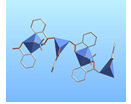 |
|
 |
|
 |
|
 |
|
 |
|
 |
|
 |
|
Study Skills for Chemistry Courses
![]()
Some differences between high school chemistry and college level chemistry:
In college:
- Test are on more material at one time
- Tests are the largest portion of your grade
- Material is covered more quickly with less in-class time
- Longer laboratory periods and lab nearly every week
- Some laboratories are much more open-ended
- Practically all problems on tests are "story" problems
- Problems are more likely to incorporate both concepts from earlier in the semester as well as the recent work, requiring you to use all the material to solve a problem
- Not as much homework collected but you are expected to be able to do homework to do well on the tests
- Mastery is seen as the ability to apply what you've learned to new situations. Many problems will require you to extend what you know to new situations, finding connections between topics that were not made explicit in class. This type of critical thinking is very important regardless of your ultimate goal for your education
- Initial problem solving typically requires working in groups
- You are responsible for coming to see the professor if you need extra help with a particular topic
- You need to study at least 2 hours outside of class for every one hour in class
- You need to regularly review class notes and text material
- Review sessions for exams are student-run. The professor is only there to clarify sticky issues.
General rules to remember:
- Problem solving is what you do when you donít know what to do!
- Life is a story problem--get used to it!
- It is impossible for me to give you any piece of knowledge--you must construct it for yourself!
- The first key to solving any problem is to understand what the problem is asking!
- You need to understand the language of chemistry to understand what a problem is asking
| DePauw University | ||||
Questions about this page should be directed to Hilary
Eppley. This page was last updated
2/7/07
.